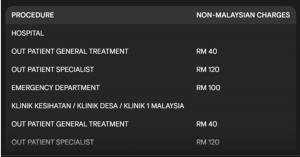
Malaysia’s Dual Healthcare System- A Call for Balanced Policy Amidst Price Scrutiny
KUALA LUMPUR, WILAYAH PERSEKUTUAN, MALAYSIA, May 20, 2025 /EINPresswire.com/ -- by Gunaprasath Bupalan
In response to recent public discussions surrounding healthcare pricing and pharmacy price labelling in Malaysia, Dr. Chang Chee Seong, a prominent voice in the nation's healthcare discourse, today issued a statement emphasising the critical balance of Malaysia’s bifurcated healthcare system. The statement advocates for a comprehensive, data-driven approach to reforms that respects the integral roles of both the public backbone and the private engine.
Malaysia's healthcare system is lauded for its unique duality: a publicly funded sector providing near-universal, highly subsidised access, and a market-driven private sector offering choice, speed, and personalised care. This equilibrium has historically ensured healthcare equity while simultaneously alleviating the burden on public facilities.
"For millions of Malaysians, the public healthcare system is an essential lifeline, offering consultations for as little as RM1.00 at Klinik Kesihatan and RM5.00 for outpatient specialist visits at public hospitals," Dr. Chang highlights. "This widespread affordability underscores the significant government subsidy extended to citizens, a matter that deserves greater transparency and public engagement regarding its scale, allocation, and long-term sustainability."
In contrast, the private sector, fuelled by out-of-pocket payments and private insurance, has evolved to deliver world-class clinical care, becoming a cornerstone of Malaysia's burgeoning medical tourism industry. In 2023, medical tourism generated an estimated RM2.25 billion, with forecasts aiming for RM2.8 billion by 2025, largely due to excellent clinical outcomes, modern infrastructure, and competitive costs.
However, recent increased intervention from government ministries, framed as "price transparency," has raised concerns within the private healthcare sector. "It is questionable why a market-funded, unsubsidised system is being regulated as though it were part of the public sector," states Dr. Chang. "Rather than reducing costs, such regulations risk inflating operational overheads, which are inevitably passed on to patients. More significantly, they risk undermining the innovation and service quality that have made the private sector – and by extension, medical tourism – a Malaysian success story."
The push for "transparency," Dr. Chang observes, appears selectively applied. "If the Ministry of Health is genuinely committed to systemic transparency, why does scrutiny begin and end with private clinics and hospitals?" he questions. "There are concerns about transparency in pharmaceutical pricing structures, insurance and third-party administration (TPA) practices, and back charges and rebates embedded within the supply chain. If pricing reform is to be equitable and meaningful, it must start at the source, not at the end of the value chain."
The statement also raises critical questions for policymakers: Is the private healthcare sector being targeted to justify a national health financing scheme? Is Malaysia ready for dispensing separation and mandatory national health financing, potentially imposing a new statutory deduction on working Malaysians?
"The overarching principle is that transparency should not be a tool of convenience, wielded selectively. It must be holistic, inclusive, and fair across the board," Dr. Chang asserts.
Dr. Chang concludes by urging policymakers to adopt a data-driven, inclusive approach that respects the vital roles played by both sectors. "Unbalanced regulation threatens not only to weaken the private sector but also to undermine Malaysia’s global healthcare reputation. Any reforms must strengthen the system as a whole and avoid dismantling what already functions effectively."
###
Chang Chee Seong
PMPASKL
+60 16-446 5126
changcs88@gmail.com
Distribution channels: Business & Economy, Consumer Goods, Healthcare & Pharmaceuticals Industry, International Organizations, World & Regional
Legal Disclaimer:
EIN Presswire provides this news content "as is" without warranty of any kind. We do not accept any responsibility or liability for the accuracy, content, images, videos, licenses, completeness, legality, or reliability of the information contained in this article. If you have any complaints or copyright issues related to this article, kindly contact the author above.
Submit your press release

